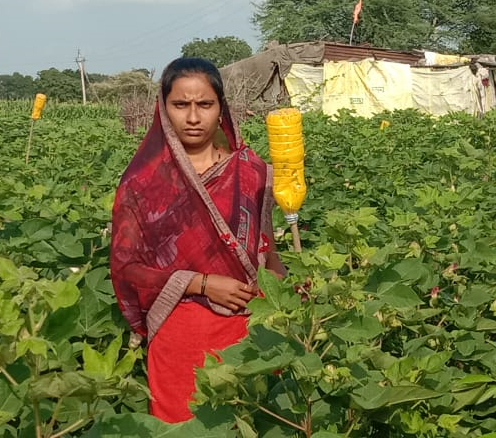Nutrition Security for the vulnerable families in the wake of COVID-19
Taslim Sharukha Pathan, the 24 years old homemaker, studied until 8th standard & hails from Vetalwadi village in Sillod block of Aurangabad. She was working as a farm laborer till six months ago when SSP visited her village & selected her as the village leader. Gradually, she learnt about SSP programs & started working for the vulnerable households in the village.
Along with the Gram Panchayat & the Self Help Groups (SHGs) in the village, she conducted awareness programs on COVID protocol, wearing masks, keeping safe distance, following hygiene practices, testing, awareness on vaccination, etc.

In her village, women used to work as laborers in the farm and were focusing on cash crops. They rarely cultivate food crops. All farmers were highly dependent on chemical farming by the usage of fertilizers, pesticides and seeds from the market.
She has formed three producer groups with the women doing the same businesses and been providing onsite training and handholding support.
Today about 20 percent of the farmers have turned to organic farming owing to the health benefits. They have started eating vegetables from their own farms or kitchen gardens. They are doing seed processing, germination and making biofertilizers themselves. They are earning additional income by saving on agricultural expenses. This has created an interest for organic farming among women farmers.
Soyabean, cotton, maize, sorghum are the most grown crops in the village, but these crops are infected with insects. To eliminate this problem, she learned to make and use colored traps at zero cost from the training provided by SSP. Using the same experiment; she made colorful traps for the women using water bottles. She planted them in the fields. Some farmers found this very strange. But when she planted it in the field and saw different insects sticking and dead on it, they realized that if you make traps by painting the bottle in yellow and planting it in different places, you can save your cost and increase the production, instead of bringing such expensive traps from the shop. These farmers are promoting this innovation to other farmers in their neighborhood.
Since I did this experiment in the village today, over 25 farmers have planted colorful traps made from bottles in their fields. And they are inviting me to visit every farm.
“Before knowing SSP, I didn’t even go out of the house. Today I am educating and working with more than 60 women in a group, guiding them on how to save on each of their expenses. And, these women are making a difference in their family and communities by spreading all the information related to their health, livelihoods and finance.”
“When I started working, there was only one SHG in my village, but today, there are six SHGs. With the support of the online trainings and continuous follow up by the SSP team, I am guiding all those women members on savings, preventive health measures, promotion of chemical free and low cost technology for saving of input cost for cultivation of food crops and starting of kitchen gardens at all homes for consumption of nutritious food intake of their family members. In future I will start and promote small scale businesses to earn an additional income for us”, says Taslim Pathan.

